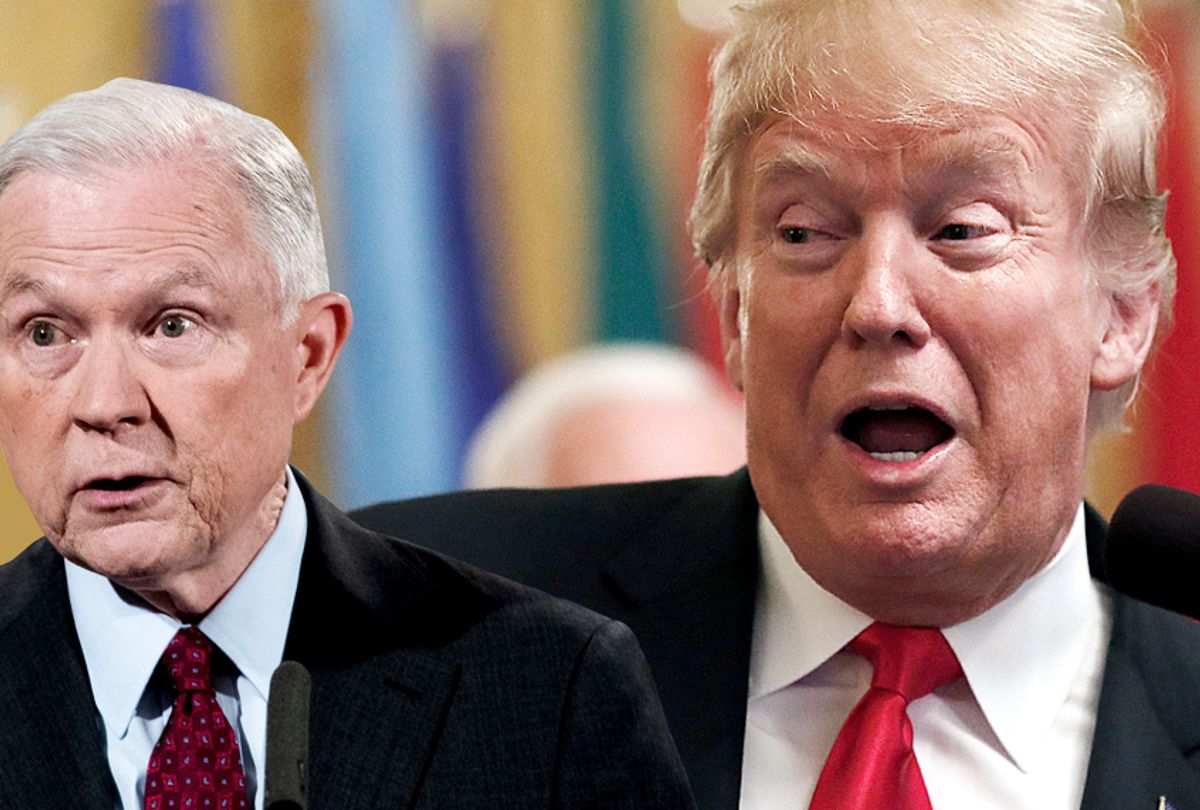Just when you thought Trump couldn’t be upstaged, he came up with something new yesterday – upstaging himself as the star of the mid-term elections by firing Atty. Gen. Jeff Sessions.
There’s no one who’s crying even crocodile tears to see Sessions go after months of public humiliation at the hands of the president, but all parties in Washington were seeing this as the opening act in moving against Special Counsel Robert S. Mueller III to stop his investigation – triggering a constitutional crisis.
None of this is in cement, of course, but attempts by journalists and cable television to get ahead of where this story is headed.
Trump committed a firing-by-tweet again, announcing that Sessions’ own chief of staff, Matthew G. Whitaker, a former legal commentator, would be the new acting attorney general. Whitaker is an outspoken advocate for limiting the Mueller probe.
The surprising part of the move was the timing: Trump had just spent a contentious 90 minutes in a press conference in which he poured praise on himself for saving the Republican majority in the Senate and generally won the election in which he was on no ballot. But at the core, Trump’s performance held a hidden threat for the incoming Democratic majority that the White House would cooperate with Democrats so long as they did not challenge him very much through promised House committee investigations.
In response, incoming Speaker Nancy Pelosi (D-Calif.) reminded the president that Democrats would try to work with him, but that Congress does have an obligation to perform oversight functions.
With the election results barely 24 hours old, Trump placed Whitaker, a Republican loyalist, into the Sessions’ job, ominously foreshadowing a move against Mueller, who, naturally, said nothing. Of course, with a stronger Republican Senate majority, gaining confirmation for a new attorney general should be easier as of January.
So, now enter Rep. Jerrold Nadler (D-N.Y.) who will head the House Judiciary Committee, the group that would receive results of any Mueller investigation that is forwarded to the house. He tweeted immediately: “Americans must have answers immediately as to the reasoning behind @realDonaldTrump removing Jeff Sessions from @TheJusticeDept. Why is the President making this change and who has authority over Special Counsel Mueller’s investigation? We will be holding people accountable.” Senate Intelligence Committee ranking member Mark Warner said that any effort to interfere in Mueller’s investigation would be a “gross abuse of power by the President.”House Intelligence Committee incoming chair Adam Schiff joined in.
And so, on the same day as the discussion of cooperation, it is on once again.
Since none of the principals speaks to the public about what they plan to do – or even much about what they are doing – the pundits and commentators tend to try to fill in the blanks. The offered story here is that Mueller has been busily going about the work of preparing whatever reports and/or indictments he has in his sights for release in the next days.
The supposedly in-crowd say that Mueller and Rod J. Rosenstein, the deputy attorney general who was just stepped over by the president to pick Whitaker, have prepared for this moment, and have plans to distribute portions of the special counsel cases to U.S. district attorney offices (as well as the New York State attorney general) to ensure that they continue even if funds are cut, or the investigation is halted.
Meanwhile, there was a whole side debate over whether Whitaker, by publishing his opinions that the special counsel report has gone too far, must recuse himself from overseeing the ongoing investigation. At a minimum, the circumstances of ousting Sessions for Whitaker could well become part of the pattern of behavior that Mueller is exploring as possible criminal obstruction of justice.
In recent days, reports have cited statements by Donald Trump Jr. that he expects to be indicted as a part of the probe. At the same time, the president has made clear throughout the process that he sees the special counsel efforts as a witch hunt that goes nowhere, that despite indictment of nearly 100 people to date, there never has been a hint of collusion with Russians in the 2016 elections.
In any event, the missing links in this story once again are Senate Republicans, who once stood as a strong line to back Sessions, but now seem to be allowing the president a long rope in this matter.
It is all a big reminder that the all-things-Russia investigation is never far from the center of the picture.
I think there was an election this week that seemed to repudiate presidential excesses. Suddenly it feels too long ago.




Shares